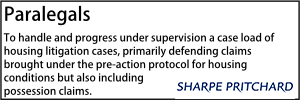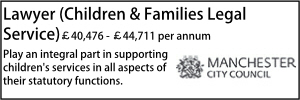



Automatic suspensions and the public interest
News
Ashfords bolsters procurement team with partner hire
Hugh James expands commercial team with partner hire
Must read
Families refusing access to support
Features

Local government reorganisation: the impact on procurement and contracts

The Procurement Act 2023 and new homes

Navigating automatic suspensions

Contracting authorities and pipeline notices

Lifting the automatic suspension: the need for evidence
Webinars
Social Partnership and Public Procurement (Wales) Act
More features
Seeking clarification of tenders
Impending Procurement Act: What you need to know
AI and procurement
Social Partnership and Public Procurement (Wales) Act
Why should you sweat the (seemingly) small stuff?
Procurement Act government guidance – Perhaps 'not a reliable method of interpretation of the law'?
Contract management and performance
The Procurement Act 2023 and development agreements
The National Procurement Policy Statement – an opportunity for mission driven procurement?
Procurement Act 2023: Are you ready?
Modification of contracts existing before the go-live date of the Procurement Act 2023
Unpicking the Procurement Act Episode 4: Challenges and Remedies
Unpicking the Procurement Act Episode 3: Contract Modification
Unpicking the Procurement Act Episode 2: Exclusion and Debarment
Unpicking the Procurement Act Episode 1: Overview and New Procedures
Dynamic purchasing systems and below threshold contracts
Procurement Act 2023: Light Touch Regime
Procurement Act guidance on frameworks is out – Buyers beware!
Local authority owned companies and the Teckal exemption
Challenges to exclusion
Challenges to exclusion
Update on limitation periods
The new procurement regime approaches
Before, during and after a waste procurement process
Disclosure in procurement disputes
The Procurement Act 2023: "go-live" confirmed
Improving social value: a private sector perspective
What’s in the Pipeline?
Procurement Act 2023 – Teckal & Hamburg Exemption
Procurement Act 2023 – Relaxation of section 17 Local Government Act 1988
Careers News
- Details
The first ever National Pro Bono Centre has opened for business today (19 October), with dedicated offices in Chancery Lane.
The initiative brings together the Bar Pro Bono Unit, LawWorks and the ILEX Pro Bono Forum. The three charities plan to work with other organisations – such as Citizens Advice Bureaux, law centres and frontline agencies across England and Wales – in a bid to provide “a more joined-up service to members of the public and to community groups in need of legal help but who cannot access legal aid and who cannot afford to pay legal fees”.
The service – which, the groups emphasised, is not a replacement for legal aid – will provide individuals with access to legal services such as housing law, employment law, family law and immigration law. Community groups and small charities will also be able to receive advice on areas such as business law.
The Chancery Lane premises include ‘hot desk’ facilities to allow the development of new initiatives.
Speaking on behalf of the three charities, Robin Knowles CBE QC, the chairman of the Bar Pro Bono Unit, said: “We are absolutely delighted, after much hard teamwork and dedication, especially by our staff, to launch the centre. It represents a further step change in the public service offered by all three branches of the legal profession, working together.
“We have been saying for many years that pro bono is part of being a lawyer, and the establishment of the National Pro Bono Centre both helps demonstrate that and will further enable it.”
The centre has been backed by the Bar Council, the Law Society and ILEX, and has received sponsorship from a range of sources, including FTI Consulting, Linklaters and Slaughter & May, to get off the ground.
“But every single contribution, large and small, from law firms, barristers’ chambers, companies and individuals has made an enormous difference,” Knowles said.
“Bringing the pro bono community together in this important, new and exciting way will make a further positive difference to many people’s lives, and in turn to society. I am proud of the profession’s readiness to make this happen.”
- Details
Three local authorities have been shortlisted for the Law Society’s Excellence Awards for 2010.
They are Scarborough Borough Council (excellence in client service), Leeds City Council (Lexcel award for excellence in practice management), and Staffordshire County Council Legal Services Unit (excellence in learning and development).
A number of public sector lawyers have also been shortlisted for individual awards. They include:
- Rizwana Kauser, Blackburn with Darwen Borough Council – junior lawyer of the year
- Laurie Trounce, Cornwall Council – junior lawyer of the year
- Steven Zdolyny, North West Development Agency – solicitor of the year (in-house)
- Harbens Kaur, Homerton Hospital NHS Trust – legal executive of the year
BBC Broadcaster Mishal Husain will present the awards at a black tie dinner and presentation ceremony on 21 October at Old Billingsgate, London.
Linda Lee, Law Society President said; "Once again, we have seen a very high standard of entries received for the Excellence Awards. Those who have made the short list should be extremely proud of getting this far, as this year we received a record number of superb entries.
"The Excellence Awards recognises the innovation, quality and tenacity that is characteristic of the legal profession. We hope the short listed will act as an inspiration to others."
- Details
Solicitors in Local Government (SLG) and the Citizenship Foundation have this month launched a local government version of the Local Lawyers in Schools initiative.
The group has two sites – in Yorkshire and Leicestershire – already signed up for the initiative, which will see local government lawyers go into schools and hold workshops with pupils about the law. Each site has a number of local authorities involved.
The sessions with KS4 pupils will cover a range of topics including employment law, human rights, consumer law, intellectual property and music downloading, and family law.
The scheme has received financial backing from the Local Government Legal Society Trust Fund, which will allow the sites to operate for three years at least.
Writing in this week’s Local Government Lawyer, Guy Goodman, immediate past chair of SLG, called on local authority lawyers to get involved.
He said: “During my year as Chair of SLG I had my eyes opened to the importance of pro bono and corporate responsibility work and the fact that we in local government don’t do enough of it.”
He added: “There has been much interest in establishing the third site but no firm proposal as yet – and there is still plenty of time to get a site up and running this school year.”
The link-up with the Citizenship Foundation is one of two partnerships the SLG has put in place – the other is with pro bono organisation LawWorks and seeks to promote and publicise pro bono opportunities to local government practitioners.
- Details
A new recruitment and retention survey of London Boroughs by London Councils has found that the capital's legal departments are finding it significantly more difficult to recruit and retain junior and mid-level lawyers than senior legal advisers and managers.
Seventy-six per cent of councils in London said that they had experienced difficulty in recruiting Level I (basic professionals) lawyers and 78% said that the same of those classified as Level II (experienced professionals). By contrast, only 67% reported difficulties in hiring Level III (principal professionals) lawyers and 64% said the same of lawyers at Level IV (divisional head/head of service).
When it comes to retaining staff, the difference between senior and junior lawyers is wider still. Seventy-two percent and 76% respectively said that they they had trouble keeping lawyers at Levels I and II, but only 56% and 57% said the same of Level III and Level IV legal professionals.
Lawyers remain amongst the most difficult of the 47 employee groups on the survey to recruit, despite being amongst the best-paid local authority employees, the survey found, with only social workers, engineers, planners and occupational therapists harder to recruit and retain.
With average packages (excluding PRP) of £38,203 and £89,035 respectively, Level I and Level IV lawyers were better paid than any other employee group at London local authorities. Level II and III lawyers, who averaged £45,545 and £56,482 respectively, were bettered only by educational psychologists and education inspectors of equivalent seniority.
- Details
A solicitor in the commercial team at Cornwall Council who only qualified in September last year has won Solicitors in Local Government’s Young Solicitor of the Year award for 2010.
Laurie Trounce joined Cornwall’s legal team at a challenging time following the council’s move to unitary status. The SLG citation said she “has displayed outstanding abilities in a range of contractual disputes, including a successful challenge against the Ombudsman”.
Trounce was nominated by Richard Williams, head of legal and democratic services at the council, who described her as “the absolute epitome of everything a local government solicitor should be – she ‘owns’ her cases and is proactive, sharp, efficient and intuitive.”
The award, which was sponsored by Trowers & Hamlins, was presented at the SLG’s Weekend School in York.
The other finalists were Rizwana Kauser from Blackburn with Darwen Borough Council and Amy Oakley from Sheffield City Council.
The award is open to individuals working in local government with up to ten years’ post-qualification experience. The criteria are that the individual must fulfil one or more of the following:
- Be innovative
- Be making or having a material impact on their local authority’s performance
- Be an exemplar of best practice
- Promote the best interests, and help raise the profile of, local government lawyers.
- Details
The terms and conditions of employment for all employed lawyers – including those working for local authorities – should allow them to carry out a part-time judicial role, the Advisory Panel on Judicial Diversity has recommended.
In a 113-page report published this week, the panel said: “Such part-time roles should be encouraged and permitted, not only in the Government Legal Service and the Crown Prosecution Service but also by those lawyers employed in local authorities and legal academics.”
It called on professional bodies such as the Law Society and Bar Council to work with their employed lawyer groups to promote part-time judicial service, including as a magistrate, and take up of the panel’s proposed Developing Judicial Skills courses.
The report recognised that employed lawyers in the public sector tend to be more diverse than those in private practice. These courses would help them decide if a judicial career is right for them and give them the necessary confidence to apply, it said.
The panel, chaired by Baroness Neuberger, acknowledged that there was “no quick fix” to moving towards a more diverse judiciary. It found that the diversity of those entering the profession is significantly greater than that of those who have the experience to apply for judicial office.
“We will achieve significant transformation if, and only if, diversity is addressed systematically – not only within the appointments process, but throughout a legal and judicial career, from first consideration of the possibility of joining the judiciary to promotion at the most senior level,” the report said.
The panel made 53 recommendations overall, including the creation of a Judicial Diversity Taskforce to oversee the delivery of reform and be responsible for overseeing progress. This taskforce would encompass the Lord Chancellor, the Lord Chief Justice, the Chairman of the Judicial Appointments Commission, the Senior President of Tribunals and the heads of the Bar Council, ILEX and the Law Society.
Other key recommendations include:
- The Judicial Appointments Commission (JAC) should revise its criteria for assessing merit, to support and underline with greater clarity its commitment to diversity
- Selection processes should be open and transparent, promote diversity and recognise potential, “not just at the entry points to the judiciary but for progression within it to the most senior levels”
- The Judicial Studies Board should evolve into a Judicial College offering courses in ‘Developing Judicial Skills’, and
- A proactive campaign of myth-busting should be undertaken as many of the perceived barriers to diversity are not reflected in practice.
The panel ruled out quotas or targets for recruiting under-represented groups, but recommended improvements to the way data is captured and stored “so that there can be systematic evaluation of what works and progress can be monitored against agreed benchmarks".
The panel said its reforms, which have not been costed, needed to be seen as a comprehensive package if significant progress is to be made.
The Lord Chancellor, Jack Straw, said he would start working immediately with the judiciary, the JAC and the heads of professional bodies to implement the report’s findings.
He added: “I am determined that race, sex, gender identity, sexual orientation or disability should be no barrier to those with ability joining the judiciary and progressing within it. Becoming a judge must be, and must be seen to be, open to everyone with the right skills and qualities.”
Guy Goodman, chair of Solicitors in Local Government, said the group warmly welcomed the advisory panel's report, adding that “a judicial career should be on the radar of every local government solicitor”.
He said: “Having participated in the panel's work we are pleased to see the specific recommendations in respect of employed lawyers. As a professional association we have been promoting judicial appointments throughout the last year working in partnership with the Judicial Appointments Commission.”
The SLG’s Weekend School in April will be hosting a workshop run by the JAC on applying successfully for a judicial appointment.
Page 87 of 88
Head of Governance & University Solicitor
Senior Lawyer - Advocate
Assistant Director - Legal & Governance
Director of Legal and Governance (Monitoring Officer)
Events

Events

Events

 Back to Basics: Construction Insurance and Insolvency - Devonshires
Back to Basics: Construction Insurance and Insolvency - Devonshires
16-07-2025 2:00 pm
Online (live)
 Institutional landlord series: Service and Notices – from Possessions to Injunctions and Requests for Access - 5 Pump Court
Institutional landlord series: Service and Notices – from Possessions to Injunctions and Requests for Access - 5 Pump Court
16-07-2025 4:00 pm
Online (live)
 HMPL Building Blocks: Tackling Non-occupation and Sub-letting - Devonshires
HMPL Building Blocks: Tackling Non-occupation and Sub-letting - Devonshires
17-07-2025
Online (live)
 To establishing whether Material Changes of Use have occurred - Ivy Legal Training
To establishing whether Material Changes of Use have occurred - Ivy Legal Training
18-07-2025 9:30 am
Online (live)
 Business and Property Masterclass #5: Interim Relief – Acting urgently and getting it right - Cornerstone Barristers
Business and Property Masterclass #5: Interim Relief – Acting urgently and getting it right - Cornerstone Barristers
10-09-2025 11:00 am
Online (live)
 Business and Property Masterclass #6: Rights of Light and Restrictive Covenants - Cornerstone Barristers
Business and Property Masterclass #6: Rights of Light and Restrictive Covenants - Cornerstone Barristers
23-09-2025
Online (live)
 HMPL Building Blocks: Service Charges & Ground Rent – Tackling Leasehold and Shared Ownership Arrears - Devonshires
HMPL Building Blocks: Service Charges & Ground Rent – Tackling Leasehold and Shared Ownership Arrears - Devonshires
14-10-2025
Online (live)
 Institutional landlord series: Possession – High Court Enforcement - 5 Pump Court
Institutional landlord series: Possession – High Court Enforcement - 5 Pump Court
22-10-2025 4:00 pm
Online (live)
 Institutional landlord series: Costs Recovery and Legally Aided Parties - 5 Pump Court
Institutional landlord series: Costs Recovery and Legally Aided Parties - 5 Pump Court
05-11-2025 4:00 pm
Online (live)
 HMPL Building Blocks: Law and Procedure Following Death of a Tenant - Devonshires
HMPL Building Blocks: Law and Procedure Following Death of a Tenant - Devonshires
09-12-2025
Online (live)
 HMPL Building Blocks: Legal Tools to Combat Anti-Social Behaviour - Devonshires
HMPL Building Blocks: Legal Tools to Combat Anti-Social Behaviour - Devonshires
17-02-2026
Online (live)
 HMPL Building Blocks: Tenancy Management – Assignment, Mutual Exchange and Succession - Devonshires
HMPL Building Blocks: Tenancy Management – Assignment, Mutual Exchange and Succession - Devonshires
12-03-2026
Online (live)

























































 A-Z Family Law: Take Two! - 42 Bedford Row
A-Z Family Law: Take Two! - 42 Bedford Row  Executive Programme in Public Procurement Law and Policy - University of Nottingham
Executive Programme in Public Procurement Law and Policy - University of Nottingham  Property Law Roadshow 2025 - Bristol - St John's Chambers
Property Law Roadshow 2025 - Bristol - St John's Chambers  CUBAS Comprehensive Training & Licencing (Manchester), September 2025
CUBAS Comprehensive Training & Licencing (Manchester), September 2025  AI in the Public Sector Conference - Westminster Insight
AI in the Public Sector Conference - Westminster Insight  Activism in the Workplace - 42BR Barristers Employment Law Annual Lecture
Activism in the Workplace - 42BR Barristers Employment Law Annual Lecture  DoLS Authoriser Training - LPS Law
DoLS Authoriser Training - LPS Law  Property Law Roadshow 2025 - Cardiff - St John's Chambers
Property Law Roadshow 2025 - Cardiff - St John's Chambers  Annual Fraud Conference 2025 - Oxford Investigation Service
Annual Fraud Conference 2025 - Oxford Investigation Service